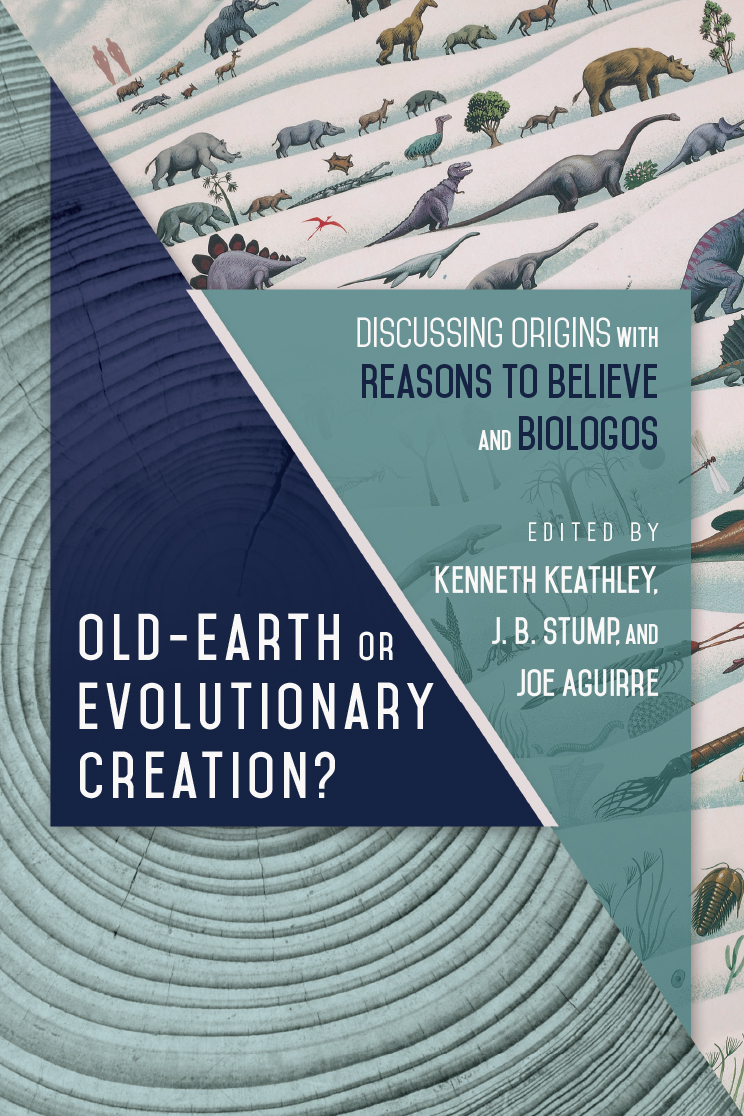
Review of Old-Earth or Evolutionary Creation?: Discussing Origins with Reasons to Believe and BioLogos, edited by Kenneth Keathley, J B Stump and Joe Aguirre.
Ian Hore-Lacy, September 2017.
Download PDF
 REVIEW OF OLD-EARTH OR EVOLUTIONARY CREATION?: DISCUSSING ORIGINS WITH REASONS TO BELIEVE AND BIOLOGOS
REVIEW OF OLD-EARTH OR EVOLUTIONARY CREATION?: DISCUSSING ORIGINS WITH REASONS TO BELIEVE AND BIOLOGOS
REVIEWD BY Ian Hore-Lacy
Review: Old-Earth or Evolutionary Creation? Discussing origins with Reasons to Believe and Biologos. Ed Kenneth Keathley, J.B.Stump and Joe Aguirre. 231 pp, IVP 2017.
This book documents an extended discussion between people from two US Christian organisations, one rejecting biological evolution and one accepting it, resulting in contrasting approaches to early chapters of Genesis. It is remarkably eirenic in an era of polarized views and identity politics. The discussion is moderated by authors from Southern Baptist Convention.
Reasons to Believe (RTB) is an organization upbeat about science and seeing it as a primary tool in evangelism with a strong commitment to biblical inerrancy. All RTB people view the creation days in Gen 1 as much longer in duration than 24 hours, but they “believe that Gen 1-11 offers a literal, chronologically-ordered account of the origin and history of the universe, Earth, Earth’s life and humans.” They make their differences with mainstream science, notably biological evolution, central to their evangelistic work. They “explicitly identify Jesus Christ as the intelligent designer and .. explicitly reject young-Earth creationism and global flood geology.” They claim “a biblical creation model that is testable, falsifiable and predictive,” though the book does not in fact test it credibly.
Biologos, founded by Francis Collins of human genome fame, and author of The language of God, accepts all mainstream science as well as the authority of the Bible. Its purpose is to show that there is no contradiction between science and Christian faith, and it is focused on preventing Christians from leaving the faith over perceived conflicts with science. The moderator expresses great appreciation for what Biologos is doing to remove barriers to Christian faith among non-Christian scientists.
Biologos takes seriously the evidence found in the natural world, with its “compelling story of evolutionary development of the diversity of life over billions of years.” The dialogue revealed a wider range of viewpoints in its ranks than RTB’s on matters such as human origins. Both groups accept that God created humans, but disagree on understanding his methods.
So it’s old-Earth creation vs evolutionary creation. But it is hard for the reader to understand how the RTB people can claim to take science seriously yet have a closed mind to biological evolution on account of their hermeneutical presuppositions.
The difference between seeing scripture as authoritative and as infallible comes down to what you think it is saying, as distinct from how it is saying it. So the differences in understanding the role of human communicators and hence of biblical interpretation are basic. For RTB, “the truths revealed in the book of Scripture” exclude young Earth notions but do not allow biological evolution, even after “determin[ing] the genre of literature being used.” Chapter 2 teases out these questions helpfully, and Biologos affirms the hermeneutical principle (oft neglected) of reading the text as ancient, not modern, while RTB “affirms a soft concordist perspective” which plays that down and aligns the purposes of the ‘books’ of science and scripture.
It is interesting that RTB is more positive about Biologos hermeneutic than the reciprocal, and that RTB document a clear exegetical critique of YEC 24-hour day interpretation of Genesis 1.
Chapters explore the two approaches to Adam and Eve, to Death, Predation and Suffering, and God’s interaction with his creation. Further chapters are on the Scientific Method and Biological Evolution, Geological Evidence, Fossil Evidence, Genetic Evidence and finally Anthropological Evidence – what does it mean to be human in the image of God?
In the Biological Evolution chapter the Biologos spokesman accuses his RTB counterpart of considering “the biological sciences to be incorrect at their very core”, and the moderator comments on the “the fact that the scientific community often weaponizes evolutionary theory against Christians”, leading him to sympathise with evangelicals who feel embattled.
A brief Conclusion acknowledges major differences which RTB feel less positive about resolving than Biologos appear to. The moderator points out that the dialogue could not have occurred forty years ago, and the Human Genome project with all the scientific insight it provides “has been a game-changer”. Also he points out that “many Old testament scholars are looking again at Genesis 1-2 in the light of the ancient Near-Eastern culture in which it was originally written.”
This is a fascinating book which will be of wide interest in the ISCAST fraternity.
Ian Hore-Lacy, Sept 2017.
720 words
See another review of this book here.

